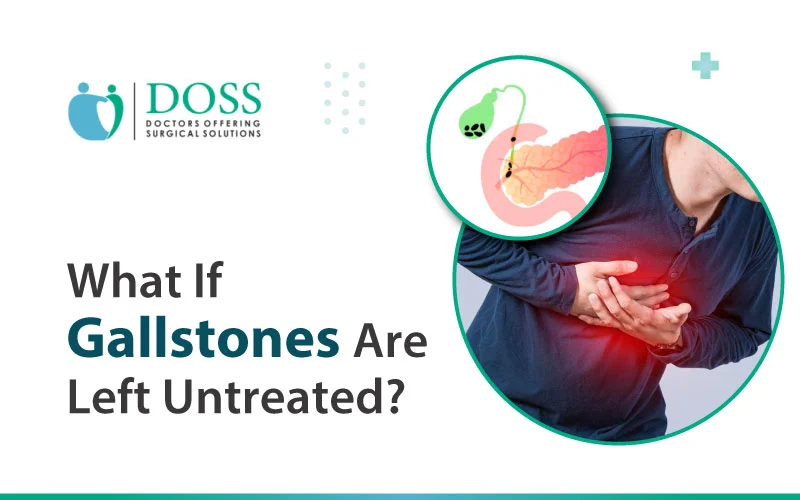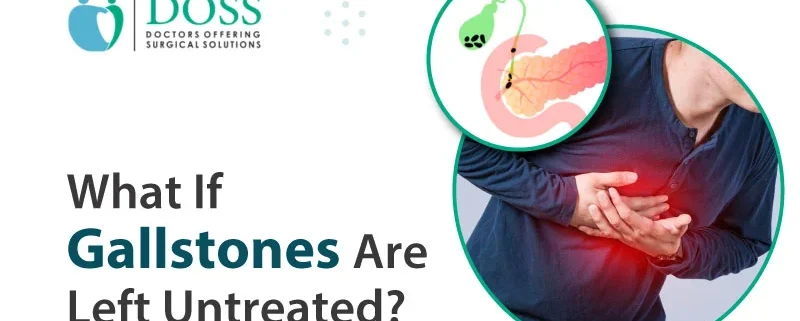What if Gallstones are Left Untreated?
Blog
Gallstones represent a widely occurring health issue in India. These hardened deposits take shape in the gallbladder – an organ lying beneath the liver whose primary function is to store bile, a substance vital for digestion.
While a portion of gallstones are asymptomatic and don’t necessitate treatment, others can trigger severe complications if neglected. Our aim is to deliver an extensive understanding of gallstones, the potential risks of untreated cases, and the urgency of timely medical intervention.
Deciphering Gallstones and their Formation
Gallstones are essentially solid accumulations that develop within your gallbladder. They manifest in two forms – cholesterol stones, which are commonplace, and pigment stones.
The genesis of gallstones is typically due to the excess of cholesterol or bilirubin in your bile, or when your gallbladder doesn’t empty fully or frequently.
The first step towards preventing gallstones is understanding the contributing factors such as obesity, a diet high in fat or cholesterol, diabetes, rapid weight loss, and specific cholesterol-lowering medications.
Regular health checks can help identify these risk factors early and allow you to make necessary lifestyle changes.
Identifying Symptoms of Gallstones
Gallstones often remain dormant, presenting no symptoms. However, when a stone obstructs a bile duct, you may endure sudden and rapidly intensifying pain in the upper right or center of your abdomen.
Other symptoms include back pain between your shoulder blades or pain in your right shoulder. Nausea, vomiting, and fever can also be indicative of gallstones. Early recognition of these symptoms is vital to prevent complications.
Seek immediate medical attention if you experience any of these symptoms.
Complications Stemming from Untreated Gallstones
Neglected gallstones can lead to various complications. Inflammation of the gallbladder (cholecystitis), for instance, can trigger severe pain and fever. A gallstone obstructing the common bile duct can result in jaundice or a bile duct infection (cholangitis).
Moreover, gallstones can block the pancreatic duct, leading to pancreatitis, an acute inflammation of the pancreas. These conditions can be life-threatening if not addressed promptly.
Regular follow-ups with your surgeon can help monitor the progress of gallstones and prevent complications.
The Impact of Gallstones on Daily Life
Untreated gallstones can significantly disrupt your daily life. The associated pain can interfere with your routine, impacting your productivity at work or school, and diminishing your overall quality of life.
Additionally, the stress and discomfort caused by gallstones can also affect your mental health, leading to anxiety or depression in some cases.
Practice stress management techniques such as meditation, yoga, and deep breathing exercises to help cope with the discomfort and anxiety caused by gallstones.
Diagnosis of Gallstones
Gallstones are often diagnosed during routine health check-ups even before symptoms begin. Doctors frequently use ultrasound imaging tests to detect gallstones. Blood tests can also help identify complications related to gallstones, such as infection, bile duct obstruction, or pancreatitis.
In complex cases, advanced imaging tests may be used. These include computerized tomography (CT) scans that provide images of the gallbladder and bile ducts, magnetic resonance imaging (MRI) that can show abnormalities in the bile ducts, and endoscopic retrograde cholangiopancreatography (ERCP), a procedure that allows your surgeons to view the bile ducts and remove a gallstone causing a blockage.
Regular health check-ups can help detect gallstones early, even before symptoms appear.
Treatment Options for Gallstones
Treatment for gallstones varies based on the severity of symptoms and an individual’s overall health. If the gallstones are not causing any symptoms, active monitoring might be all that’s needed. However, if you’re experiencing significant pain or have had one or more gallstone complications, your surgeon will likely recommend treatment.
Medications can sometimes dissolve gallstones, but this treatment may take months or years to work, and stones can re-form if treatment is stopped. Therefore, for severe symptoms, your surgeon might recommend a cholecystectomy – a surgery to remove the gallbladder.
This procedure can be performed laparoscopically or through open surgery, depending on the patient’s condition and the surgeon’s recommendation.
Discuss with your surgeon the best treatment option for your condition.
Also Read – Gallbladder Surgery Cost in Pune
Importance of Seeking Medical Attention
Timely medical intervention is crucial in managing gallstones. Delaying treatment can lead to serious complications, including intense pain, infections, and even life-threatening conditions like pancreatitis.
If you experience symptoms of gallstones, it’s important to consult a specialist for a comprehensive evaluation and appropriate treatment.
Don’t ignore symptoms. Seek immediate medical attention if you suspect you have gallstones.
Lifestyle Changes for Prevention
Certain lifestyle modifications can help prevent the formation of gallstones. These include maintaining a healthy weight through regular physical activity and a balanced diet rich in fruits, vegetables, whole grains, lean meat, and dairy products.
Avoid high-fat and high-cholesterol foods as they can contribute to gallstone formation. Rapid weight loss can upset the balance of bile salts and cholesterol, leading to gallstone formation, so it’s vital to lose weight gradually.
Regular physical activity not only helps maintain a healthy weight but also promotes normal gallbladder function and reduces the risk of obesity, a significant risk factor for gallstones.
Incorporate regular exercise and a healthy diet into your daily routine to prevent gallstones.
In conclusion, Understanding gallstones, recognizing their symptoms, and seeking timely medical intervention are critical to preventing serious health complications.
Prioritize your health – if you’re experiencing symptoms suggestive of gallstones, don’t hesitate to seek professional medical advice. Remember, an early diagnosis can lead to more effective treatment and better health outcomes. Your health is your most precious asset; guard it with knowledge, vigilance, and immediate action.


 +919011100010
+919011100010 


